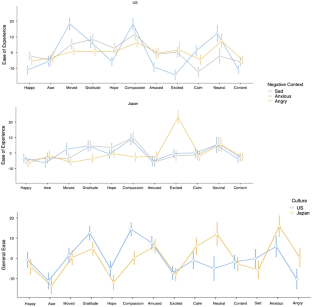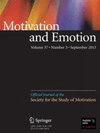在消极环境中体验积极情绪的容易程度
IF 2.5
3区 心理学
Q3 PSYCHOLOGY, EXPERIMENTAL
引用次数: 2
摘要
本文章由计算机程序翻译,如有差异,请以英文原文为准。

The ease of experiencing positive emotions in negative contexts
求助全文
通过发布文献求助,成功后即可免费获取论文全文。
去求助
来源期刊

Motivation and Emotion
Multiple-
CiteScore
5.40
自引率
4.20%
发文量
69
期刊介绍:
Motivation and Emotion publishes articles on human motivational and emotional phenomena that make theoretical advances by linking empirical findings to underlying processes. Submissions should focus on key problems in motivation and emotion, and, if using non-human participants, should contribute to theories concerning human behavior. Articles should be explanatory rather than merely descriptive, providing the data necessary to understand the origins of motivation and emotion, to explicate why, how, and under what conditions motivational and emotional states change, and to document that these processes are important to human functioning.A range of methodological approaches are welcome, with methodological rigor as the key criterion. Manuscripts that rely exclusively on self-report data are appropriate, but published articles tend to be those that rely on objective measures (e.g., behavioral observations, psychophysiological responses, reaction times, brain activity, and performance or achievement indicators) either singly or combination with self-report data.The journal generally does not publish scale development and validation articles. However, it is open to articles that focus on the post-validation contribution that a new measure can make. Scale development and validation work therefore may be submitted if it is used as a necessary prerequisite to follow-up studies that demonstrate the importance of the new scale in making a theoretical advance.
 求助内容:
求助内容: 应助结果提醒方式:
应助结果提醒方式:


